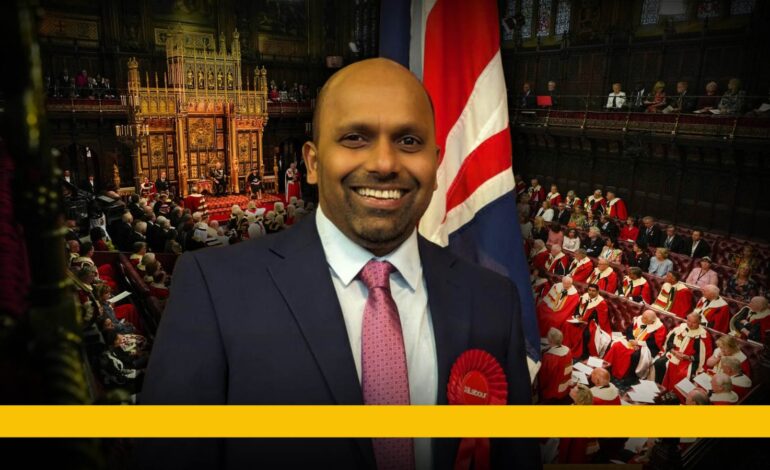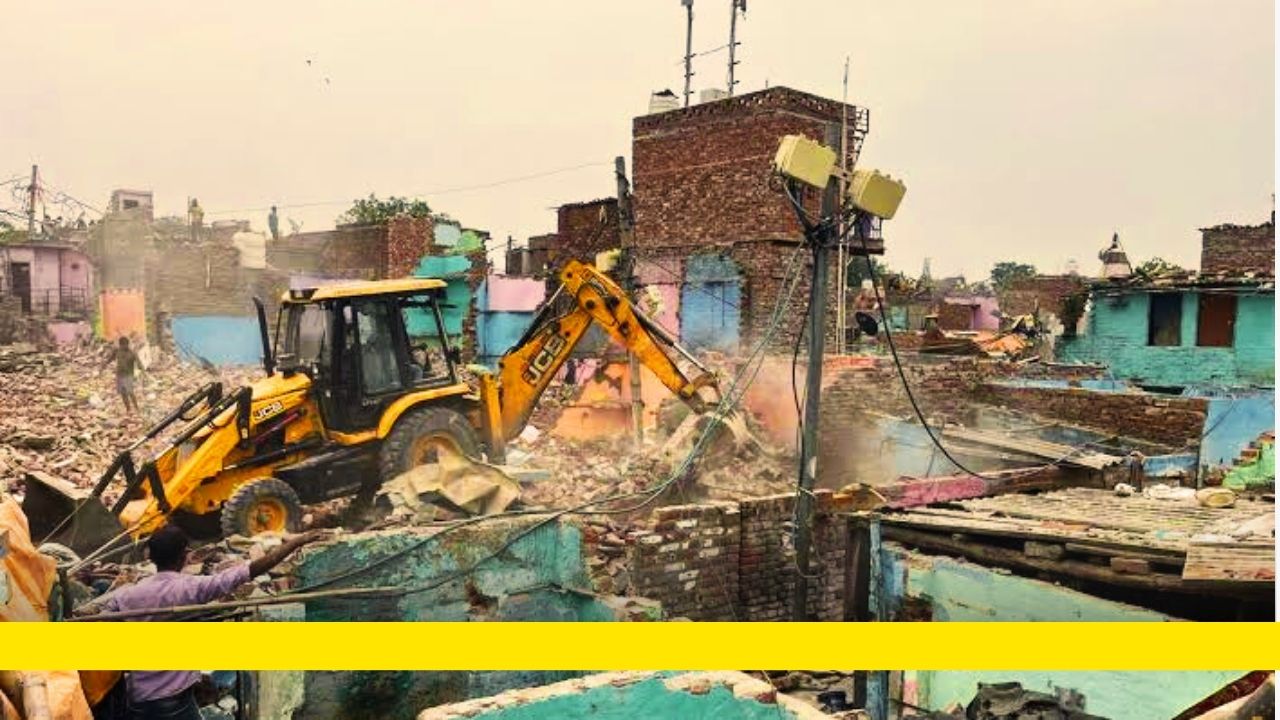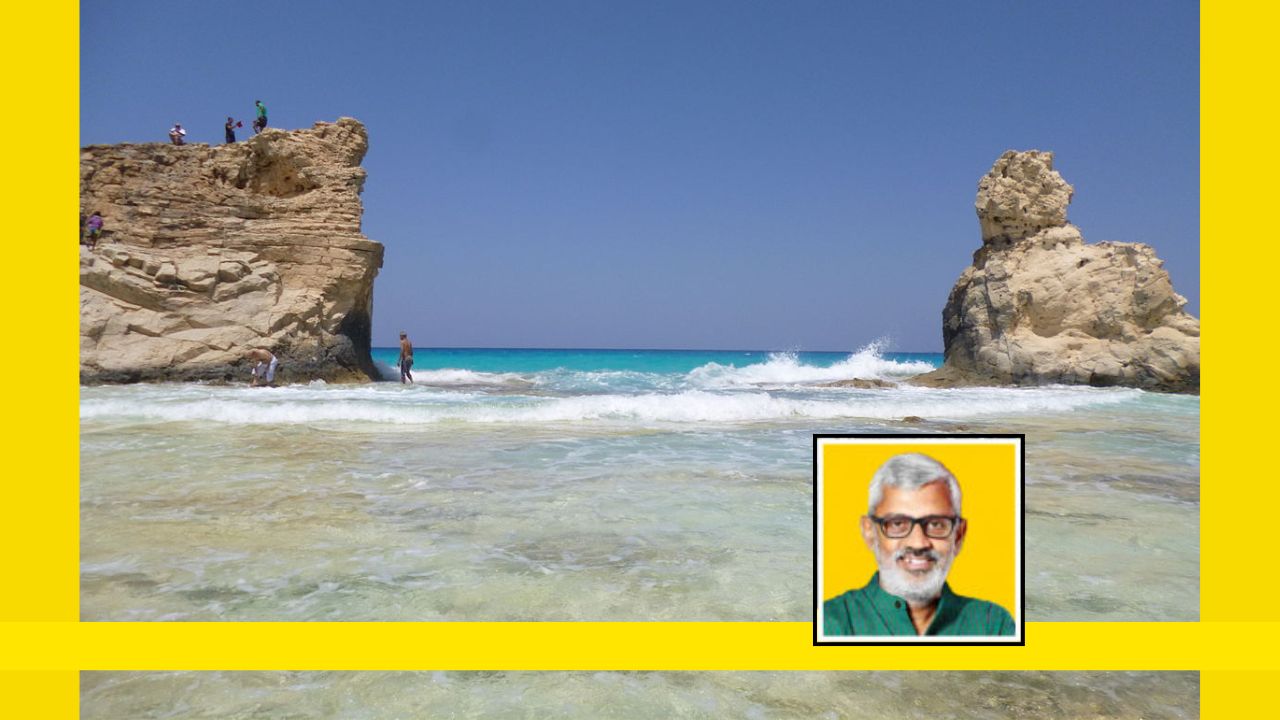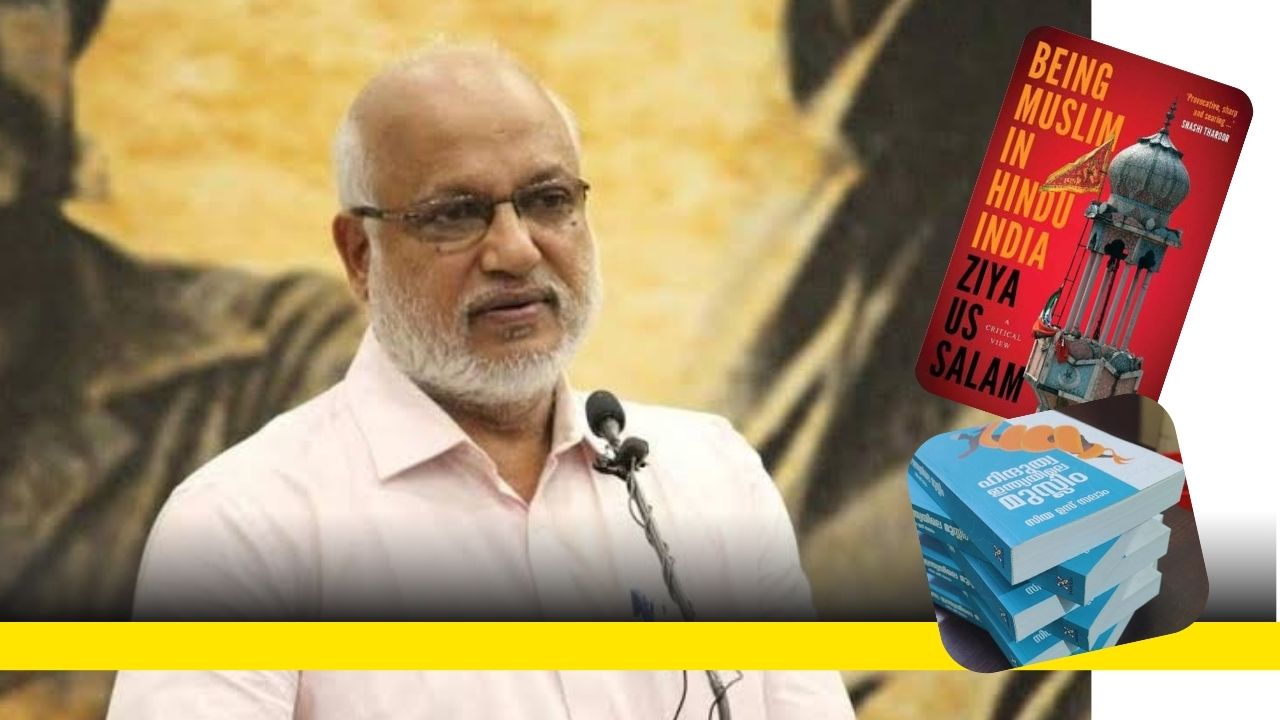Permanently On the Precipice: Sujatha’s Life As Panchayat President And After
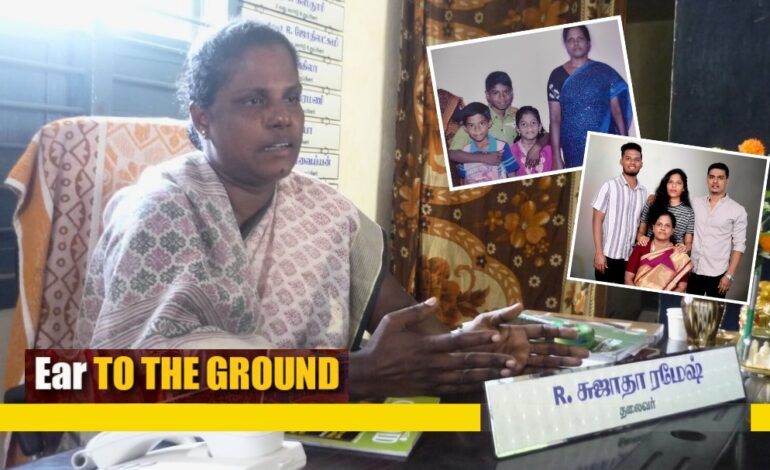
Ear to the Ground is a special feature by The AIDEM that reports on offbeat field reports on people’s lives and livelihood issues.
At first glance, there was nothing unusual in my journey to Puthoor Panchayat in Palavayal, Thiruvallur, some thirty kilometres from Chennai. I had been on many such trips, both official and unofficial. Many of them were solo trips as well. But that was the first time I was visiting a woman whose name had the tag “one who could be murdered any moment”. My journey was not to some prison where death sentences were being carried out but to a village. Sujatha Ramesh was the Panchayat president there – a woman living with the knowledge that she could be killed any moment.
A telephonic conversation with her was what led to this journey. It was in the year 2015. “Even now, I am not allowed to raise the tricolour on Independence Day. They used to openly say that a Dalit woman cannot raise the tricolour. These days they deviously invite a freedom fighter (evidently belonging to the upper castes) and let them raise the tricolour instead of me. These are only trivial things. I have been receiving death threats from the beginning. So I thought let me face death, living this life my way. These are stories that I live, Amma. Do come. I’ll tell you everything.” Sujatha Ramesh told me on the phone then.
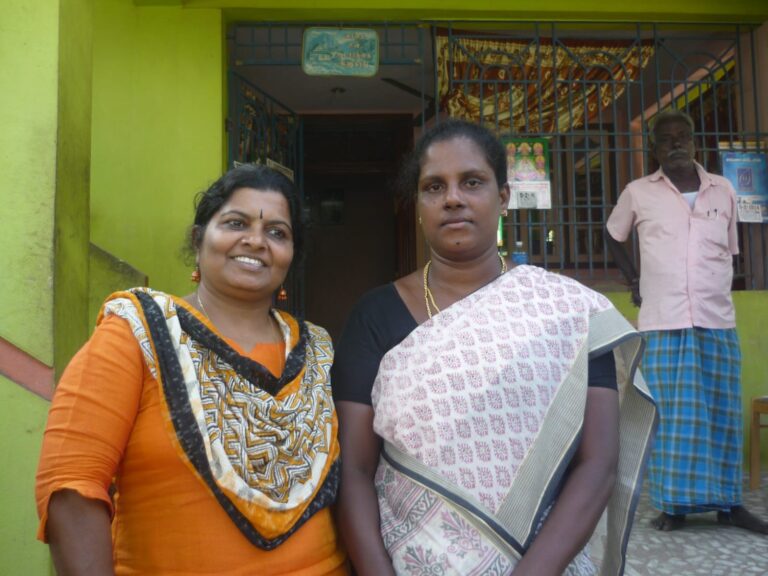
I was sceptical when I decided to embark on the journey to hear everything in person. It was a hot afternoon when we reached Sujatha’s panchayat. Dry backyards, dusty plants and trees, gravel paths, public tube wells on the road side and women and children waiting in front with pots and vessels – A sight typical in Tamil Nadu. Sujatha phoned me and apologised. “ I am sorry Amma, I am a bit late. Will be there soon “. Sujatha told me to wait in front of the panchayat office.
There was Amma (not me, but J. Jayalalithaa, the original Amma of Tamil politics at that time) on many posters pasted in front of the panchayat office. Amma was all over the rooms visible from outside. Sujatha Ramesh arrived on her scooter, throwing up dust. She parked her scooter hurriedly and came to us.
‘They started mining soil from the quarry again. I got delayed there. Please come inside.’
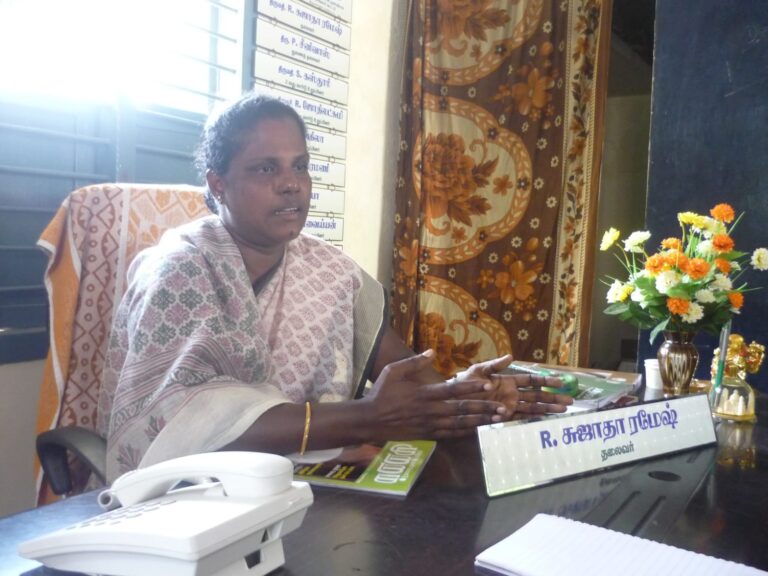
As I entered the office with Sujatha, I saw yet another person’s photo beside Amma. ‘Ramesh, former panchayat president’ was written beneath the photo. ‘That’s my husband. He was the president of this panchayat for many years. He died of cancer at the age of 38. He loved the people of this panchayat dearly. He made me promise ‘when I die, you must look after the people of this village like I used to ’. Sujatha came to this panchayat from a distant village called Ambathoor after her marriage.
‘My father passed away when I was very young. I lost my younger sister when she was very little and after a few years my younger brother too died. My mother raised me selling fish in the market. Now she lives alone in the village.’
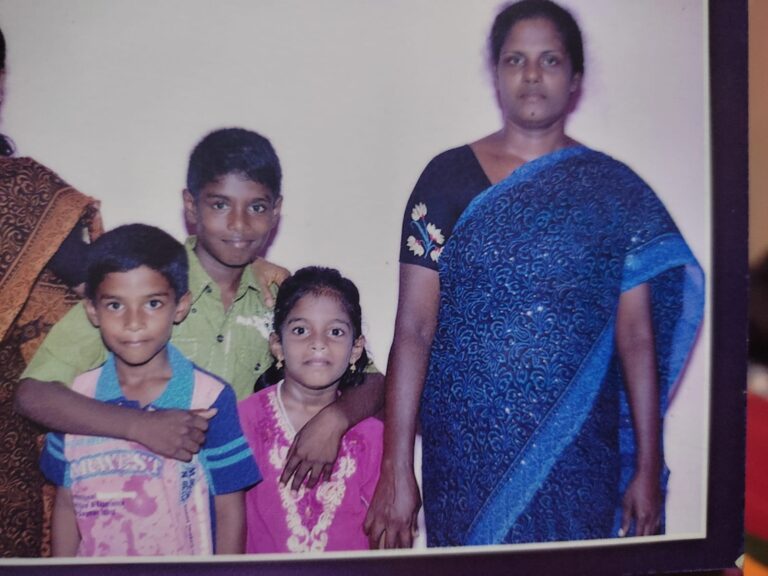
Sujatha did her schooling till the eighth grade and learnt some sewing, and soon she got married and was brought to this village like every other village girl. Even though she found that her husband was unlike the other men in the village Sujatha didn’t think there was anything unusual about her life. She kept house, gave birth to three children one after the other,wore a new saree for temple festivals and Deepavali every year- she led a typical Tamil girl’s life.
Everything turned upside down with her husband’s illness and death. When her husband died and another election was announced, she entered the race to become the Panchayat President. For Sujatha, Puthoor was not just a place she was brought to. It was the place her husband entrusted her with on his death bed. Leaving that place was like leaving her life. Sujatha had spent most of her life with Ramesh till she was widowed at the age of 30.
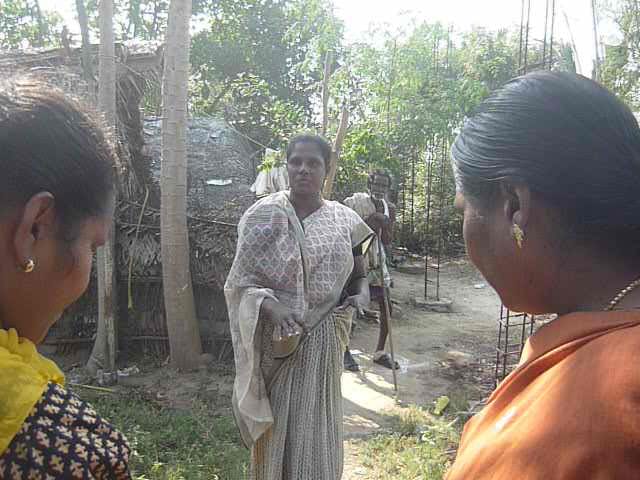
‘I knew that the people of the village would not accept me : I was not just a woman but a Dalit too. Still, I didn’t imagine that the antagonism would be so fierce. They declared, “Her husband is no more, she has no claims to this soil now”.
They asked me to return to my village. My husband’s family threatened me many times, they gave me an ultimatum too. But I could not go back. I had to fulfil my promise to my husband. I had to stand for the election. Many people behaved atrociously with me. “Are you available?’ I have heard this obscene question many a time. I had no time for all that. I had to win. I had to keep my word to my husband. I had to fulfil his dream.’
Sujatha wiped her eyes brimming with tears, sitting on the chair of the panchayat president. It seemed that she hadn’t opened up for a very long time. Her tears had dried up. Words poured out. Those words showed how that young woman’s world was turned around by this single stubborn thought- ‘I want to live in this soil too.’ Another world was opening up in front of me. A world of discrimination, violence, abuse and injustice.
I remembered the tempting beauty of nature and the exciting views of the monuments, palaces, buildings, gardens, mountains and rivers I had encountered on my earlier journeys. On Journeys that I undertook to comfort and pacify my heart, I encountered fake smiles and false talk. I felt I might need a different sensibility to experience the India that I am about to see with Sujatha Ramesh, it was not the kind of India that I saw at Taj Mahal, Jaisalmer, Charminar, India gate and the like. ‘My people won my election for me. They gave me the love they had for my husband. They came and voted for me notwithstanding the threats of the upper castes.’(Later in many parts of Tamil Nadu I witnessed the sight of upper castes holding power through money and muscle power even when Dalits were more in number).
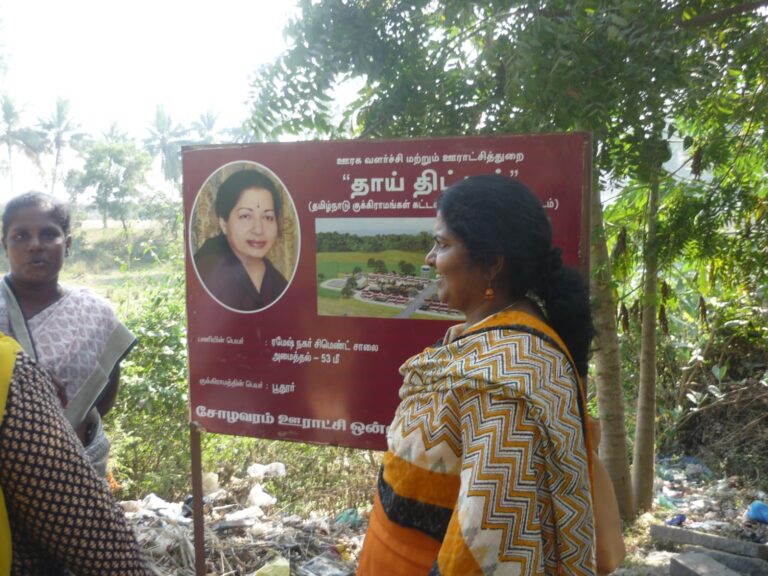
“Even though I was elected as the panchayat president, they did not let me sit on the chair for the president in the beginning. I had to sit on the floor for many days. But I was not ready to give up. At last, they had to accept defeat. Every day they found new ways to humiliate me. One day a ward member told me: ‘remove your clothes and come with me’ Would you believe it, a ward member! The representative of a locality! I was furious, never before had I felt so outraged.I beat him up with whatever I could get hold of. He lay there beaten up in a heap. After some time, I felt sorry for him. After all, the cancer that has infected this village will not end with him. I took Rs 100 from my purse and handed it to him saying ‘Go get some salve for the bruises. Something to lessen the pain.’ He fell at my feet and apologised. I had to put up with such behaviour from men not once or twice but several times.”
I went to that panchayat when Sujatha was elected as the president for the second time. There was a computer, TV and the like in the well-kept panchayat office. Information regarding the scheme ‘nalvazhvu’ was pasted on the wall. ‘I look after the people of the panchayat today just like my husband used to do, Amma. I reach every nook and corner of the village on my scooter. I try to cater to their needs. I fetch an electrician from the electricity office if the power supply is disconnected. I do my duty with the intention of helping the poor. That is what annoys the upper castes here. Until now they used to decide what a Dalit woman can aspire to. They cannot tolerate me. They tried to kill me several times. They even threw acid bomb in an attempt to kill me.’
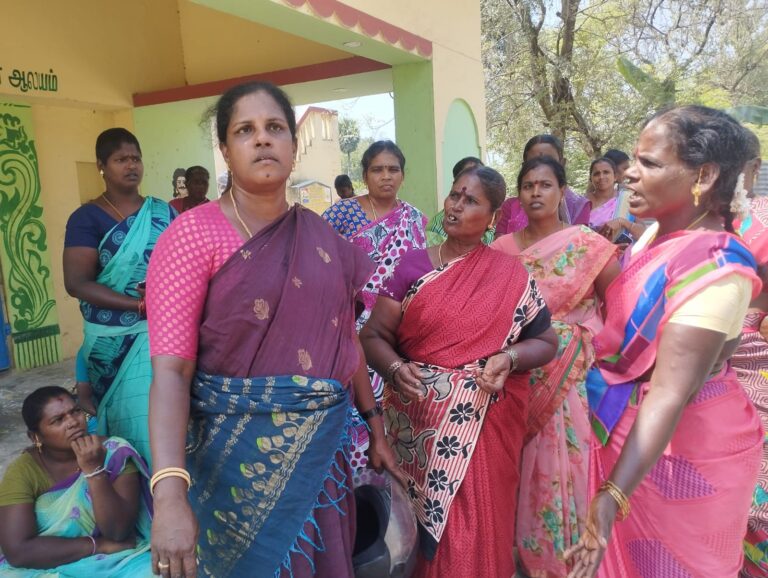
Sujatha is fighting relentlessly. ‘Aren’t you scared, Sujatha?’ I asked her in trepidation..‘’Of course I am scared. Even the lion gets scared. But it doesn’t show its fear. You cannot be the king if you expose your fears. Likewise, I am also pretending to be unfazed. It is not an easy thing to live knowing that you could be killed any moment. I’ve told my son who is in the 11th standard to somehow flee with his siblings and go live in a hostel in case amma gets killed’’.
Sujatha burst into tears. When she stopped crying,she said: ‘I am overcoming my fear and somehow gaining courage. No matter how much I am attacked, I won’t cower. They think I am an easy prey because I am a widow, a woman and a Dalit. But I am not ready to give up. Sujatha is not one to accept defeat and slink home as they expect. “
Sujatha says that the discrimination she faces in the name of her caste and gender are comparatively trivial. It’s the attacks on her for other matters that are more troubling.’Once they attacked me for attempting to bring water and electricity to the Irula community who live on the outskirts of the village. The people of Irula, belonging to the scheduled tribes reside in the panchayat- owned property on the margins of the highway. The upper caste people had encroached on the panchayat land which my husband had forcibly vacated to find a place for Irulas to live. I was attacked on the pretext that panchayat fund cannot be utilised for bringing water and electricity to that place. I used my personal funds to make it possible. I asked the Reddyars who came to attack me – ‘’Is Dalit water different from Reddyar water? When you are about to die, will you wait for Reddyar water?’’
I was amazed at the inner strength of this innocent woman. Sujatha has learned how to drive a car, auto, lorry and almost every vehicle and I was amazed to hear that now she wants to learn how to drive an aeroplane.She told me about her battle with the sand mafia. ‘‘I stopped the Reddyars using their influence to transport soil from the village without submitting a bid for tender. That was when this battle started. They can influence people in the higher offices. They will get things done their way bypassing me. They get the trees cut down, soil mined and taken away. They will loot the village dry.’’
Sujatha took me to the quarry on her scooter. As we travelled past the village filled with mud huts thatched with palm leaves, we approached a big pond. ‘This used to be a hill. Look at it now. They turned this into a pond, transporting all the soil from here. They are out for my blood because I objected to it’ she said sadly.‘They can never accept a Dalit woman. If I am present the upper caste people will not attend the gramsabha even now. Those things don’t bother me anymore. I have come a long way since the days I had to sit on the floor because they wouldn’t let me sit on the President’s chair.
As I bowed my head in respect before this not so educated, widowed mother of three children there was one sentence that got imprinted on my mind ‘I look after this land the same way I deal with my household matters. ”
She took me to visit the Irulas who were living on the border areas of the village. They came running to meet her as if she were god. It was a Tamil village full of small huts with very low walls. A group of women wearing colourful clothes and big ‘thakka and thoda’ in their pierced ears surrounded us with smiling faces. They brought us water. Sujatha smiled. She must have been reminded of the days when the price of that water was her life.
I was thinking about my life changing experiences while returning from Tiruvallur in the evening. I was soon convinced of the fact that each journey to this Indian village will reform me completely.
Ten years later, in 2024, I realised suddenly that Sujatha Ramesh was once again occupying my thoughts. Where is she now? What is she doing these days? What was her fate in the play of life and death? I started out with these questions in search of Sujatha. I could not reach her on the old telephone number.Many months I went searching for her with the help of my journalist friends in Chennai. Finally,Dr. Alby John, Tiruvallur District collector helped me find her.
When I reached her yet again, she asked me surprised, ‘Do you remember me still?’ she was in tears when she heard me say ” I never forgot you” and she said: ‘I am an ex-panchayat president now amma… Finally, they defeated me in the election. They resorted to many dirty tricks to win. I still live here in my husband’s village. I haven’t returned to my birth place in Keezhenam village, Ambattur. My life is in the service of the people of this village. I am here trying to fulfil my husband’s last wish. I can help the people through social service as well. I know all about the running of the panchayat administration as I was the panchayat president for three terms. Everyone is betraying the poor. They come to me for help as they don’t know any better. I live serving the people, running their errands. I don’t receive any remuneration for that, I don’t wish for it either.”
She said that the current Panchayat President was not doing things properly. ‘For the past four years, there has been no light on the streets. It was on my initiative that bulbs were bought and installed”.Sujatha is ready to do anything for the people; be it taking the patients to hospitals in her own car for treatment, accompanying people to the police station, to the advocate and what not.
Sujatha is there for the elderly when they need her. There are many who believe that Sujatha can fix all their problems Sujatha has been working for them relentlessly.“I used to be scared of the people here. You also know about the ways in which the upper castes tried to harm me.
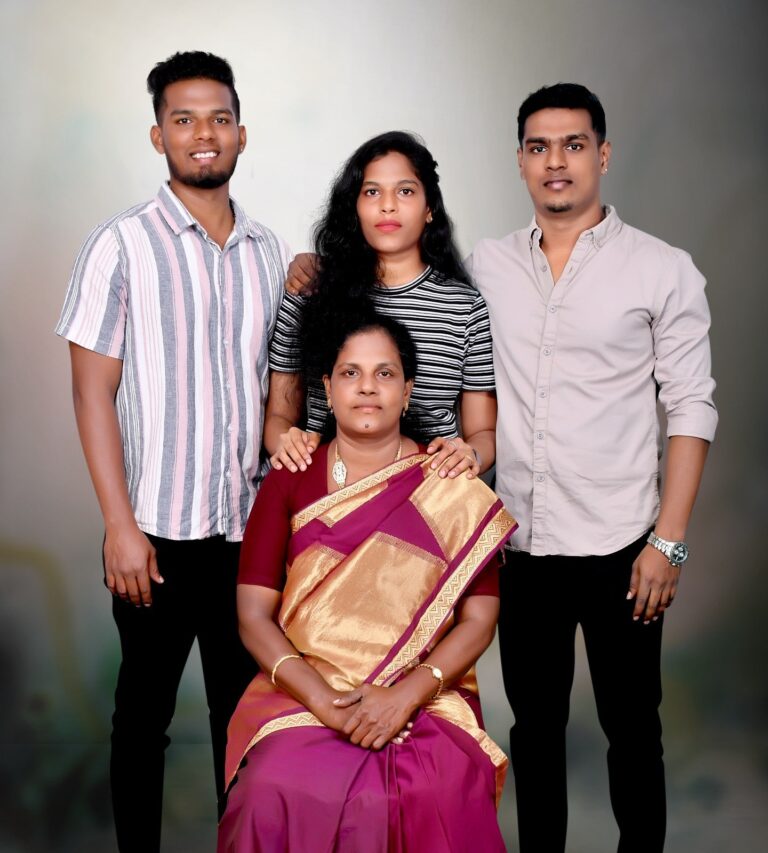
But the situation has changed from the last time you visited me. I am not scared of anyone now. Now it is like they are scared of me. Now they are saying ‘she is a man, not a woman’. They get scared when I stand up for people’s cause. From the beginning, the Reddyars were annoyed with me. They could not stand a Dalit woman becoming the panchayat president. They didn’t like whatever I did in the panchayat for the benefit of the Dalits. They were irked by the development I brought to the village by bringing water and electricity under the ‘thai’ scheme and carrying out developmental activities for the 40 Irular families by forming a unit named ‘ramesh nagar’. They are trying to evacuate those poor people. The upper castes cannot digest the things I do for the poor. They keep filing case after case to defeat me and I have been pursuing that for some time now. They plan to tire me out with these cases. They had calculated that I would get fed up with going to the police station, RTO office etc and that I would finally resign. I sought the help of the journalists. Many reported my case. They wrote about how my life was disrupted. The Government intervened. The Reddyars confessed before the investigating officers : ‘we cannot accept a Dalit woman becoming the president”.
Sujatha has three children -two sons and a daughter. When her husband passed away, the eldest was five years old, the second child was three and the youngest was only a few months old. Now her eldest son has passed civil engineering. The second son is preparing to do MBA. Her daughter is studying physiotherapy. Her children ask her why she doesn’t give up her social work. They want her to stop fighting for people’s causes and focus on her family.
‘’I have only one answer. I cannot forget the promise I made to my husband. So, I will devote the rest of my life to the people of this locality, I am not bothered with my children’s disinterest in politics. I am fighting without giving up, Amma. I am sure that the people will ultimately succeed, Truth shall prevail.’’
Sujatha is not ready to give up yet and is preparing for the next battle with all her might. Whether success or failure awaits her, she is not scared. She has learned long before that one has to face life like a lioness.
For more stories from the Ear to the Ground series, click here.



